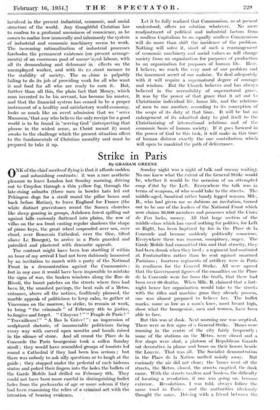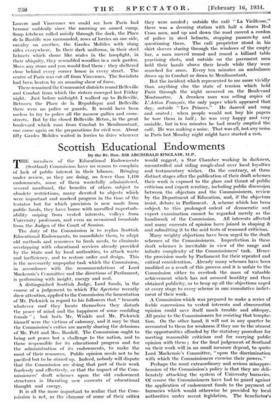Strike in Paris
By GRAHAM GREENE
ONE of the chief merits of flying is that it affords sudden and astonishing contrasts : it was a rare aesthetic pleasure to leave London last Sunday morning, driving out to Croydon through a thin yellow fog, through the late-rising suburbs (three men in bowler hats led out Pekingese dogs for a stroll round the pillar boxes and back before Matins), to leave England for France (the white distinct gravestones round the Sussex churches like sheep grazing in groups, 'Ashdown forest spilling out against hills curiously flattened into plains, the row of villas on the sea front casting regular shadows the shape of piano keys, the great wheel suspended over sea, over cloud,. over Beauvais Cathedral, over the Oise, tilted above Le Bourget), to Arrive in a Paris guarded and patrolled and plastered with dramatic' -appeals.
. -The contrast might have been less startling if within an hour ot my arrival I had not been dubiously honoured by an invitation to march with a Party of the. National Front. in a demonstration against the Communists ; but in any case it would have been impossible to mistake the signs of war, the .broken windows along the Rue de Rivoli, the burnt patches on the streets where fires had been 'lit, the smashed pavings, the bent rails of a Metro. entrance, -above all the notices, faultlessly phrased, the 'marble appeals of politicians to keep calm, to gather at Vincennes on- the morrow, to strike, to remain at work, to bring "the. criminals" of February 6th to justice, to.forgive and forget. " Citoyens ! " Peuple de Paris !
" Travailleurs!" "A Bas la Greve! " : an impression of sculptured rhetoric, of innumerable politicians. facing every way with carved open mouths and hands raised in the silence -of stone. And all round the Place de la Concorde the Paris bourgeoisie took a sullen Sunday stroll ; they would have resembled groups of tourists led round a Cathedral if they had been less serious ; but there waS nobody to ask silly questions or to laugh at the guide ; they- stopped under the pedestal of each hideous statue and poked their fingers into the holes the bullets of the Garde Mobile had drilled on February 6th. They could not have been More careful in distinguishing bullet holes from the pockmarks of age or more .solemn if they hathbeen examining the relics' of a -criminal act. with the intention "of bearing evidence: Sunday night was .a night of talk and uneasy waiting. No one knew what the extent of the General Strike would be, whether it would be the occasion of an attempted coup d'etat by the Left. Everywhere the talk was in terms of weapons, of who would take to the streets. The middle-aged, fanatical rather bandy legged woman, Mlle. B., who had given me so dubious an invitation, turned out to be one of the leaders of the National Front which now claims 50,000 members and-possesses what the Croix de Feu lacks, money. All that large section of the middle-class which has cared nothing for politics, for Left or Right, has been baptized by fire in the Place de la Concorde and become suddenly politically conscious. Everywhere there was rumour, conspiracy, anger. The Garde Mobile had committed this and that atrocity, they had been drunk when they fired ; a regiment had mutinied at Fontainebleu rather than be sent against unarmed Parisians ; fourteen regiments of artillery were in Paris in readiness for the General Strike. All were agreed that the Government figures of the casualties on the Place de la Concorde were far from the truth, that there had been over 60 deaths. When Mlle. B. claimed that a fort- night -hence her organization would take to the streets with the rifles and machine guns they already possess, one was almost prepared to believe her. . The bullet marks,- some as low as a man's knee, most breast high, show What the bourgeoisie, men and women, have been Able to face.
But this was at dusk. Next morning one was sceptical. There were So few. signs of a General Strike. 'Buses were running in the centre of the city fairly frequently ; some of the stations on the Metro, were closed and a few shops were shut, a platoon of Republican Guards sat decorative in plume and brass on their horses beside the Louvre. .. That was all. The Socialist demonstration in the Place de In Nation melted noisily away. But -curiously the Mr did not clear; the 'buses went off the Streets, the .Metro. closed, the streets emptied, the dusk came. With the streets taxiless and 'busless, the difficulty of locating a revolution, if one was going on, became extreme. Revolutions, I was told, always follow the same road in Paris ; and the authorities obviously thought the same. "hiving with a friend between the -Louvre and . Vincennes we could see how Paris had become suddenly since the morning an • armed camp. Soup kitchens rolled noisily through the dark, the Place de la Bastille was surrounded, rows of lorries on one side, cavalry on another, the Cardes Mobiles with slung rifles everywhere. In their dark uniforms, in their steel helmets which shone like scales in the lamplight, in their ubiquity, they resembled woodlice in a rock garden. Move any stone and you would find them : they sheltered close behind every corner house in every. street. The centre of Paris was cut off from Vincennes. The Socialists had been beaten by an amazing show of force. - There remained the Communist districts round Belleville and Combat from which the rioters emerged last Friday night. Just before midnight I walked up to Belleville. Between the Place de la Republique and Belleville there were no police or guards. It would have been useless to try to police all the narrow gullies and cross- streets. But by the closed Belleville Metro., in the great boulevard which runs from • Combat to Menilmontant, one came again on the -preparations for civil war. About fifty Gardes Mobiles waited in lorries to drive wherever they were needed ; outside the cafe "La Vieilleuse," there was a dressing station with half .a dozen Red Cross men, and up and down the road moved . a cordon of police in steel helmets, stopping passers-by and questioning them. The cafe proprietor stood in his shirt sleeves staring through the windows of the empty bar, a man moved round and round a billiard table practising shots, and outside on the pavement men held their hands above their heads while they were searched for arms.. Every ten minutes an ambulance drove up to Combat or down to Menilmontant.
But the incident which represented to me more vividly than anything else the state of tension which held Paris through the night occurred on the Boulevard Montmartre. A drunken man was selling copies of L'Action Francais, the only paper which appeared that day, outside "Les Princes." He danced and sang and orated ; when people would not buy his papers he tore them in half ; he was very happy and very amiable, but in ten minutes he had nearly emptied the cafe. He was making a noise. That was all, but any noise in Paris last Monday night might have started a riot.









































 Previous page
Previous page